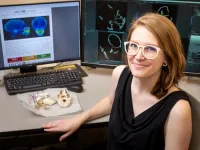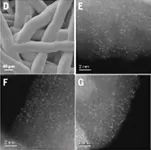(Press-News.org) DURHAM, N.C. – A team led by the Duke Human Vaccine Institute (DHVI) has developed a vaccine approach that works like a GPS, guiding the immune system through the specific steps to make broadly neutralizing antibodies against HIV.
Publishing in the journal Cell Host & Microbe, the study describes an approach that provides step-by-step directions for the immune system to generate the elusive, yet necessary antibodies for a successful HIV vaccine.
“HIV is the fastest-evolving virus known. So it’s been a long-standing goal in HIV research to create a vaccine that can generate broadly neutralizing antibodies that can recognize diverse HIV strains,” said lead author Kevin Wiehe, Ph.D., associate professor in the Department of Medicine at Duke University School of Medicine and director of research at DHVI.
Wiehe and colleagues started with an engineered version of a broadly neutralizing antibody in its original state, before any mutations occurred. Knowing that the antibody will need to mutate to keep up with the ever-changing HIV virus, the researchers then added sequential mutations one-by-one to determine which mutations were essential for the antibody to broadly neutralize HIV.
Doing this allowed them to figure out what the exact points were along the route to arrive at broadly neutralizing antibodies. They then developed a vaccine which gave the immune system the turn-by-turn directions to follow that mutational route.
Using mice specially bred to encode for the original version of the antibody, the researchers demonstrated that the guidance system approach triggered the immune system to start churning out the sought-after antibodies.
“This paper shows that our mutation-guided vaccine strategy can work,” said Wiehe, adding that the technique could also be used in vaccines for other diseases. “This strategy potentially gives us a way to design vaccines to direct the immune system to make any antibody we want, which could be a broadly neutralizing antibody for all coronavirus variants, or an anti-cancer antibody.”
Wiehe said the next challenge will be to reproduce the study in primates and then humans.
In addition to Wiehe, study authors includes Kevin O. Saunders, Victoria Stalls, Derek W. Cain, Sravani Venkatayogi, Joshua S. Martin Beem, Madison Berry, Tyler Evangelous, Rory Henderson, Bhavna Hora, Shi-Mao Xia, Chuancang Jiang, Amanda Newman, Cindy Bowman, Xiaozhi Lu, Mary E. Bryan, Joena Bal, Aja Sanzone, Haiyan Chen, Amanda Eaton, Mark A. Tomai, Christopher B. Fox, Ying Tam, Christopher Barbosa, Mattia Bonsignori, Hiromi Muramatsu, S. Manir Alam, David Montefiori, Wilton B. Williams, Norbert Pardi, Ming Tian, Drew Weissman, Frederick W. Alt, Priyamvada Acharya, and Barton F. Haynes.
The study received funding support from the National Institute of Allergy and Infectious Diseases, a part of the National Institutes of Health (UM1AI144371, 1U19AI135902-01, P01AI131251-01).
###
END
The National Science Foundation awarded $630,444 to Kathleen Paul, an assistant professor of anthropology at the U of A, to provide a comprehensive outline of dental genetic architecture for two primate species of tamarins and macaques.
Paul's research team’s ultimate goal is to harness this information to advance bioanthropological practice, including the use of teeth for reconstructing evolutionary processes and experiences of stress and illness.
No live animals will be used in the research. Instead, skeletonized individuals from collections ...
Discrimination may speed up the biological processes of aging, according to a new study led by researchers at the NYU School of Global Public Health.
The research links interpersonal discrimination to changes at the molecular level, revealing a potential root cause of disparities in aging-related illness and death.
“Experiencing discrimination appears to hasten the process of aging, which may be contributing to disease and early mortality and fueling health disparities,” said Adolfo Cuevas, assistant professor in the Department of Social and Behavioral Sciences at NYU’s ...
COLUMBUS, Ohio – Systems controlled by next-generation computing algorithms could give rise to better and more efficient machine learning products, a new study suggests.
Using machine learning tools to create a digital twin, or a virtual copy, of an electronic circuit that exhibits chaotic behavior, researchers found that they were successful at predicting how it would behave and using that information to control it.
Many everyday devices, like thermostats and cruise control, utilize linear controllers – which use ...
University of Leeds news release
Embargoed until 1900 BST, 9 May 2024
How climate change will affect malaria transmission
A new model for predicting the effects of climate change on malaria transmission in Africa could lead to more targeted interventions to control the disease according to a new study.
Previous methods have used rainfall totals to indicate the presence of surface water suitable for breeding mosquitoes, but the research led by the University of Leeds used several climatic and hydrological models to include real-world processes of evaporation, infiltration and flow through rivers.
This ...
Machine learning enables cheaper and safer low-power magnetic resonance imaging (MRI) without sacrificing accuracy, according to a new study. According to the authors, these advances pave the way for affordable, patient-centric, and deep learning-powered ultra-low-field (ULF) MRI scanners, addressing unmet clinical needs in diverse healthcare settings worldwide. Magnetic Resonance Imaging (MRI) has revolutionized healthcare, offering noninvasive and radiation-free imaging. It holds immense promise for advancing medical diagnoses through artificial intelligence. However, despite its five decades of development, MRI remains largely inaccessible, particularly ...
Areas at risk for malaria transmission in Africa may decline more than previously expected because of climate change in the 21st century, suggests an ensemble of environmental and hydrologic models. The combined models predicted that the total area of suitable malaria transmission will start to decline in Africa after 2025 through 2100, including in West Africa and as far east as South Sudan. The new study’s approach captures hydrologic features that are typically missed with standard predictive models of malaria transmission, offering a more nuanced view that could inform malaria control efforts in a warming world. Most of the burden of malaria falls on people living ...
Sea surface temperature anomalies in the Indian Ocean predict the magnitude of global dengue epidemics, according to a new study. The findings suggest that the climate indicator could enhance the forecasting and planning for outbreak responses. Dengue – a mosquito-borne flavivirus disease – affects nearly half the world’s population. Currently, there are no specific drugs or vaccines for the disease, and outbreaks can have serious public health and economic impacts. As a result, the ability to predict the risk of outbreaks and prepare accordingly is crucial for many regions where ...
Using more than 1.4 petabytes of electron microscopy (EM) imaging data, researchers have generated a nanoscale-resolution reconstruction of a millimeter-scale fragment of human cerebral cortex, providing an unprecedented view into the structural organization of brain tissue at the supracellular, cellular, and subcellular levels. The human brain is a vastly complex organ and, to date, little is known about its cellular microstructure, including the synaptic and neural circuits it supports. Disruption of these circuits is known to play a role in myriad brain disorders. Yet studying human brain ...
The highest performing countries across public health outcomes share many drivers that contribute to their success. That’s the conclusion of a new study published May 9 in the open-access journal PLOS Global Public Health by Dr. Nadia Akseer, an Epidemiologist-Biostatistician at Johns Hopkins Bloomberg School of Public Health and co-author of the study and colleagues in the Exemplars in Global Health (EGH) program.
In recent years, the EGH program has begun to identify and study positive outliers when it comes to global health programs around the world, with an aim of uncovering not only which health interventions work, ...
As the world is transitioning from a fossil fuel-based energy economy, many are betting on hydrogen to become the dominant energy currency. But producing “green” hydrogen without using fossil fuels is not yet possible on the scale we need because it requires iridium, a metal that is extremely rare. In a study published May 10 in Science, researchers led by Ryuhei Nakamura at the RIKEN Center for Sustainable Resource Science (CSRS) in Japan report a new method that reduces the amount of iridium needed for the reaction by 95%, without altering the rate of hydrogen production. This breakthrough could revolutionize our ability to produce ecologically ...

